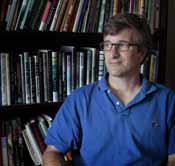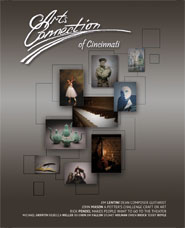
Michael Griffith, in his office at University of Cincinnati, 2011 PHOTO ARTS CONNECTION OF CINCINNATI
“Writing is nothing more than a guided dream”, Jorge Luis Borges
Michael Griffith, author and U.C. Associate Professor of English, believes in empathetic imagination, in making the effort to understand others. By creating characters and stepping into life and circumstances helps him to better understand himself. His books don’t come from his life in a direct autobiographical sense but rather represent his way of thinking as a prodigy that eventually faces a crash of illusions of having superior qualities and deals with the threat of public failure. His characters have multiple identities and tend to negotiate between roles in order to find a comfortable point in a complicated and sometimes frightening world; they feel trapped and escape from created stereotypes to search for maximum freedom in their new roles.
Griffith was born in the small town of Orangeburg, South Carolina. He started to write in high school but wasn’t enthusiastic about writing until his pre-college study at Phillips Exeter Academy where he was inspired by the literary work of Jorge Luis Borges, Argentine poet, essayist and short story writer-idealist, whose fictions of philosophy and dreams became classics of the 20th-century.
In 1987, Michael Griffith was admitted to Princeton University and focused his study on Germanic Languages and Literatures. The classic tradition of German literature supported his emerging interest in short stories and novellas, which later became his favorite literary genre. Heinrich Von Kleist – the dramatist, lyricist and a master in the art of narrative, Thomas Mann, known for his series of highly ironic epic novels and novellas and Theodor Fontane, novelist and poet, who thrust the German novel into the mainstream of Europe social realism were among the writers who most influenced Michael Griffith during his college years. Discouraged and at the same time encouraged by one of his professors, Griffith – a summa cum laude graduate of Princeton – didn’t start writing until 1992. Frustration with the possibility of not performing at the best level and the intense schedule of writing, which was a working style and expectations of his professor, kept him from writing for several years. Eventually, he explored the theme of identity failure and false idealism in his future books.
In 1992, Griffith earned a master of fine arts in Creative Writing from Louisiana State University and began to work on his first novel named Spikes, which took him several revisions and over 8 years to complete. Today, Michael Griffith has published three books: Spikes: A Novel (2000), awarded as one of South Carolina’s Best Five Books of 2001, Bibliophilia: A Novella and Stories (2003), and Trophy: A Novel (2011).
“I really don’t like to write for most of the process,” says Griffith. “I find it so intensely frustrating. But there comes a point where you can suddenly see a way through your project, and then there is such an intense high. It seems like I do 80% of the writing in 10% of the time, but there is no shortcut to that moment. You just have to sit in the room and loathe yourself for not getting much done. While you think through the project, you have to fail and fail again, as expressed in the famous line of Samuel Becket.”
Please read full article in Winter issue

